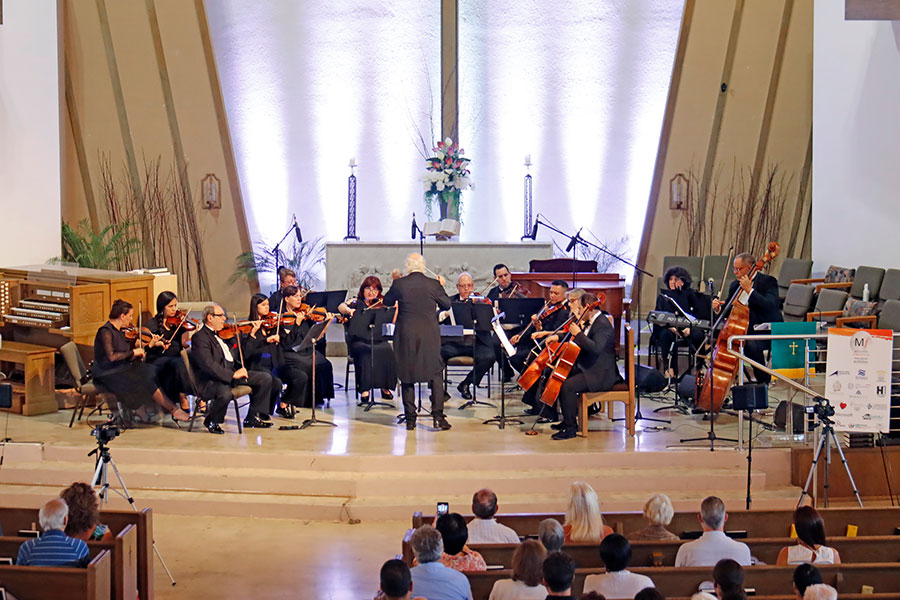A large audience turned out for a delightful Sunday afternoon musicale on August 25 at United Church of Christ in Fort Lauderdale. “Summer Strings” was an astutely chosen program of classical scores for string ensemble. Italian composer-pianist-conductor Lorenzo Turchi-Floris led the 13 member Music for America String Orchestra and French violinist Charlotte Orcel took a star turn in two of the concertos from Antonio Vivaldi’s The Four Seasons.
Turchi-Floris opened the program with the Intermezzo from Puccini’s opera Manon Lescaut. As the conductor told the audience, Puccini died 100 years ago in 1924. The string players exuded depth of tone and projection in the acoustically resonant sanctuary. Turchi-Floris brought out the flowing lyrical line and tragic undercurrents of this orchestral interlude from the 1893 opera that put the composer on the musical map. (The score portrays the heroine’s tortuous journey to La Harve where she is to be deported to France’s rural colonies in America.) The allusion, at the work’s conclusion, to the opera’s love theme was particularly effective.
Dvořák’s Slavonic Dance in E minor, Op. 72, No.2 sings forth with one of the most haunting melodies in the entire musical literature. The group’s corporate tonal sonority was lustrous and transparent, doing full justice to the composer’s thematic genius. Turchi-Floris assayed the contrasting central section with character and verve. The Adagio Cantabile from Beethoven’s Piano Sonata No. 8 in G Major finds the titan from Bonn at his most noble and serene. This melody was the theme music of the late musicologist- conductor Karl Haas’ long running radio program Adventures in Good Music. Turchi-Floris’ own transcription for strings was skillful, encompassing both the serenity and darker tension in the opus, and it was beautifully played.
Orcel took center stage for Summer from Vivaldi’s quartet of concertos describing the changing seasons. These works were the first example of descriptive, programmatic music. From the outset of the initial Allegro non molto, Orcel’s incisive attack, agility and spare vibrato riveted attention. In the Adagio (second movement), her purity of sound and precise intonation vividly conjured up a languid afternoon. The summer storm of the final Presto emerged fierce in intensity at a brisk pace. The orchestral contingent supported Orcel in a vigorous fashion.
Following intermission, Orcel was even more impressive performing Winter from the Vivaldi cycle. The icy string textures of the opening potently evoked the cold milieu. Orcel’s dexterity and robust articulation enlivened the allegro that followed. Over plucked strings, Orcel imbued the memorable theme of the Largo with eloquence and aristocratic turns of phrase, aided by finely terraced dynamics. The gusts of wind that mark the concerto’s concluding Presto found Orcel capturing both the lyricism and dazzling virtuosity of Vivaldi’s iconic opus. She received a well deserved standing, cheering ovation from the concertgoers.
Turchi-Floris calmed the waters with a fine transcription of the aria “Lascia Ch’io pianga” from Handel’s opera Rinaldo, taken at a stately tempo. British composer Gustav Holst is best known for his orchestral blockbuster The Planets, but his more intimate works radiate melodic charm and grace. The St. Paul’s Suite is one of the best of the compositions Holst wrote for the young players at the school where he taught for much of his life. Turchi-Floris emphasized the taut, lively dance rhythms of the opening Jig. The players’ deftness of bowing and touch enhanced the bright airiness of the Ostinato (second movement).Spare sonic patterns projected the more solemn and dramatic character of the Intermezzo , shaped with feeling by Turchi-Floris who brought ample drive to the animated Vivace episode. Rustic folk infused lines infused the final Dargason with sparkling brilliance. Buttressed by standout solos throughout the concert from concertmaster Orlando Forte, the entire instrumental ensemble shone with brilliance, bringing life to Holst’s chamber orchestral gem.
Gutsy articulation and wild abandon marked Jeff Manookian’s reduction of Dance of the Montagues and the Capulets from Prokofiev’s classic ballet score Romeo and Juliet. As an encore, Turchi-Floris offered a brightly detailed Can-Can from Offenbach’s Orpheus in the Underworld, the audience clapping along. He concluded the afternoon with Zequinha de Abreu’s popular Brazilian dance Tico-Tico, played with gusto. The entire program was a model of fine summer fare, performed with precision and artistic integrity.






















